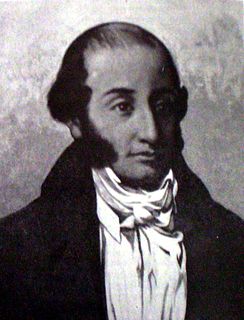
Mataró is the capital and largest town of the comarca of the Maresme, in the province of Barcelona, Catalonia Autonomous Community, Spain. It is located on the Costa del Maresme, to the south of Costa Brava, between Cabrera de Mar and Sant Andreu de Llavaneres, 30 kilometres north-east of Barcelona. As of 2010, it had a population of c. 122,932 inhabitants.

The "Argentine National Anthem" is the national anthem of Argentina. Its lyrics were written by the Buenos Aires-born politician Vicente López y Planes and the music was composed by the Spanish musician Blas Parera. The work was adopted as the sole official song on May 11, 1813, three years after the May Revolution; May 11 is therefore now Anthem Day in Argentina.
Spanish naming customs are historical traditions for naming children practised in Spain. According to these customs, a person's name consists of a given name followed by two surnames. Historically, the first surname was the father's first surname, and the second the mother's first surname. In recent years, the order of the surnames in a family is decided when registering the first child, but the traditional order is still largely the choice. Often, the practice is to use one given name and the first surname most of the time, the complete name being typically reserved for legal, formal, and documentary matters; however, both surnames are sometimes systematically used when the first surname is very common to get a more customized name. In these cases, it is even common to use only the second surname, as in "Lorca", "Picasso" or "Zapatero". This does not affect alphabetization: discussions of "Lorca", the Spanish poet, must be alphabetized in an index under "García Lorca" and not "Lorca".

The Pacific black duck, commonly known as the PBD, is a dabbling duck found in much of Indonesia, New Guinea, Australia, New Zealand, and many islands in the southwestern Pacific, reaching to the Caroline Islands in the north and French Polynesia in the east. It is usually called the grey duck in New Zealand, where it is also known by its Maori name, pārera.

Spain competed at the 1988 Summer Olympics in Seoul, South Korea. 229 competitors, 200 men and 29 women, took part in 130 events in 24 sports. At the closing ceremony, a Spanish segment was performed, as the country hosted the next Olympics in Barcelona.
Silvia Parera Carrau is a former medley and breaststroke swimmer from Spain, who competed at three consecutive Summer Olympics for her native country, starting in 1988 in Seoul, South Korea.
Valentín Parera was a Spanish actor who appeared in both silent and sound films in the 1920s and 1930s. He was married to the American singer and actress Grace Moore from 1931 until her death in a 1947 plane crash.

Blas Parera (1777–1840) was a Spanish music composer and teacher. He lived his part of his life in Buenos Aires.

The Central Entre Ríos Railway (CERR) was a railway company in the Entre Ríos Province of Argentina, owned by the provincial government, which built and operated a 1,435 mmstandard gauge railway network between the rivers Paraná and Uruguay. In 1892 it was sold to the British–owned Entre Ríos Railway.
Manuel Parera Penella was a Spanish footballer who played for FC Barcelona during the 1920s and 1930s. He scored the club's first ever Primera División goal in 1929.
Blas is mainly a Spanish given name and surname, related to Blaise. It may refer to
Parera is a town in La Pampa Province in Argentina.
The National Music Award is one of Spain's annual National Awards awarded by the Ministry of Culture.

Restless Hearts is a 1928 German-Spanish silent film directed by Benito Perojo and Gustav Ucicky and starring Betty Bird, Hanna Ralph and Livio Pavanelli.
Wine Cellars is a 1930 French-Spanish film directed by Benito Perojo and starring Colette Darfeuil, Valentín Parera and Enrique Rivero. It was originally made as a silent film, with sound added later. Based on the film's reputation, Perojo was invited to Hollywood to make Spanish-language films for the major studios.

A Lucky Man is a 1930 American comedy film directed by Benito Perojo and starring Roberto Rey, María Luz Callejo and Valentín Parera. It is a Spanish-language film made for the Hollywood company Paramount Pictures at their Joinville Studios in Paris. Separate versions were also made in French and Swedish. The French version is known as A Hole in the Wall.
My Wife's Teacher is a 1930 comedy film directed by Robert Florey, and starring Imperio Argentina. It was made as the Spanish-language version of the German film Rendezvous. Such multi-language versions were common during the early years of sound. A separate French version as also released as Love Songs. The film's sets were designed by Julius von Borsody.
The Last Torch Song is a 1957 Spanish musical film directed by Juan de Orduña and starring Sara Montiel, Armando Calvo and Enrique Vera.
The Legion of Silence is a 1956 Spanish drama film directed by José María Forqué and José Antonio Nieves Conde and starring Jorge Mistral and Nani Fernández.
Miquel Parrera Pizá is a Spanish professional footballer who plays for RCD Mallorca as a goalkeeper.







